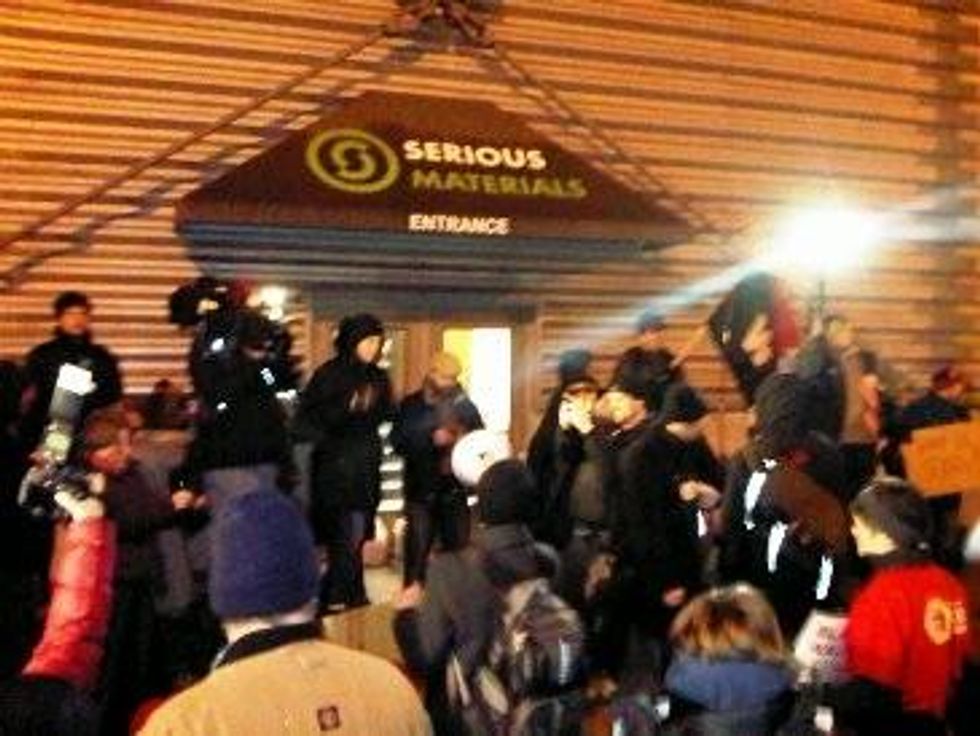As President Obama was speechifying about our economic futures this week, workers in one famous Chicago factory were taking one big step towards theirs.
A group of the workers who occupied the Republic Windows and Doors factory in 2008 have founded a worker-run cooperative. They've incorporated in the state of Illinois; they've made a bid to buy the machinery from their former employer; now, all they are waiting for is a serious response from Serious Energy, the company that took over the plant from Republic.
Looking for a way to save good jobs in a tough economy? Go co-operative, say these workers. In 2008, they occupied their plant for six days after Republic closed the plant and tried to scuttle out of state owing the Chicago workers back-pay and benefits. (The occupiers won a $1.75 million settlement from Bank of America and Chase Bank.) After a lack-luster couple of years, the subsequent owners, Serious Energy, announced their intent to close the plant this February. Says Melvin Macklin, a glass manufacturer who's been working at the plant for over a decade:
"Republic walked away from our jobs. Serious walked away from our jobs, but we are not walking away from our jobs... "
On May 30, 2012 Macklin and 22 other workers founded New Era Windows, LLC a worker-run cooperative to manufacture what they promise will be "quality, affordable windows." After a brief occupation earlier this year, Serious agreed to give the workers the first option to buy the plant's equipment. New Era made the bid last month.
"We've opened a bank account, the workers have put in a bid, now what is the company waiting for?" Says Leah Fried, field organizer for the United Electrical workers (UE,) which represents the workers.
It's in this sort of situation that a functioning industrial policy could make all the difference, says Brendan Martin, a former Wall Street trader who founded The Working World to help support worker-run businesses. In tough economic times, keeping a factory in place in a hard-hit community helps the entire local economy. A newly-announced city plan to retrofit Chicago for energy efficiency could offer a green windows company a mountain of useful business. But it's going to be heavy lifting for the workers to raise enough money to buy even the minimum amount of equipment they'll need to go into production, let alone the most top-of-line technology.
"If there was any sort of rational industrial policy coming out of Washington," says Martin, "government would be helping enterprises like these get the equipment they need to produce the next generation of high quality green products."
As it is, the workers and their allies are hoping to raise about $500,000 to buy the basics and the workers' sweat equity will have to make up for the lack of capital.
If President Obama had really wanted to signal a new economic agenda, he was in the right Ohio city this Thursday. Cleveland is home to the country's largest industrial co-ops in the country, the Evergreen network, which includes an industrial laundry, serving the local university and city hospital. Obama didn't visit or even allude to Evergreen, but the Chicago workers are in conversation with the Evergreen workers. They're learning all they can from the rise of co-operatives across the US, and they're excited about becoming one of the first unionized industrial co-operatives in the country.
It's not just about profits, says Macklin, it's about sustaining communities, keeping jobs in places where people need them. He's even heard rumors that some co-ops create credit unions, capable of proffering student loans to needy families. Helping workers' kids get an education is not part of a profit-above all else business plan, he agrees, but worker co-ops are free to devise their own priorities says Macklin.
"The owners' agenda is always different from the workers,' " he says. "But in a co-op, the workers' and the owners' are one and same."
So far, the New Era workers have decided that all the worker/owners will earn equal wages and each will have one vote in decision-making. Each worker will each have to raise a fee of $1,000 to "buy in." It's a stretch in hard times, and Macklin, who is 58, borrowed some of his "buy-in" from a nephew. Still, he believes New Era will be able to competeeven after two companies have thrown in the towel,because,
"There will be no big, fat-cat salaries, no CEOs, CFOs and COOs to pay - so our bottom line will be easier. We already know how to make the best windows and we're learning how to promote and sell."
He concludes: "We don't know for sure it'll be successful, but we didn't know the occupation would be successful (I thought I was going to jail.) Unless we step out and try, we'll never know."
New Era is on a fundraising drive. Mayor Rahm Emmanuel could soon have the perfect company to buy from. Meanwhile, people can contribute or invest at Causes.com
I had a chance to talk with UE's Leah Fried about all this last month at Labor Notes 2012. Video:

